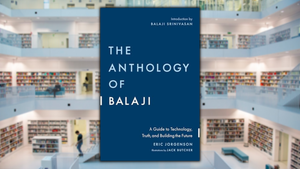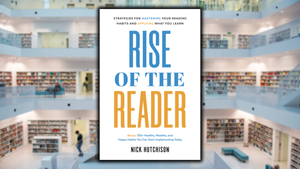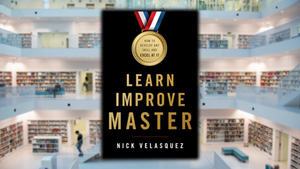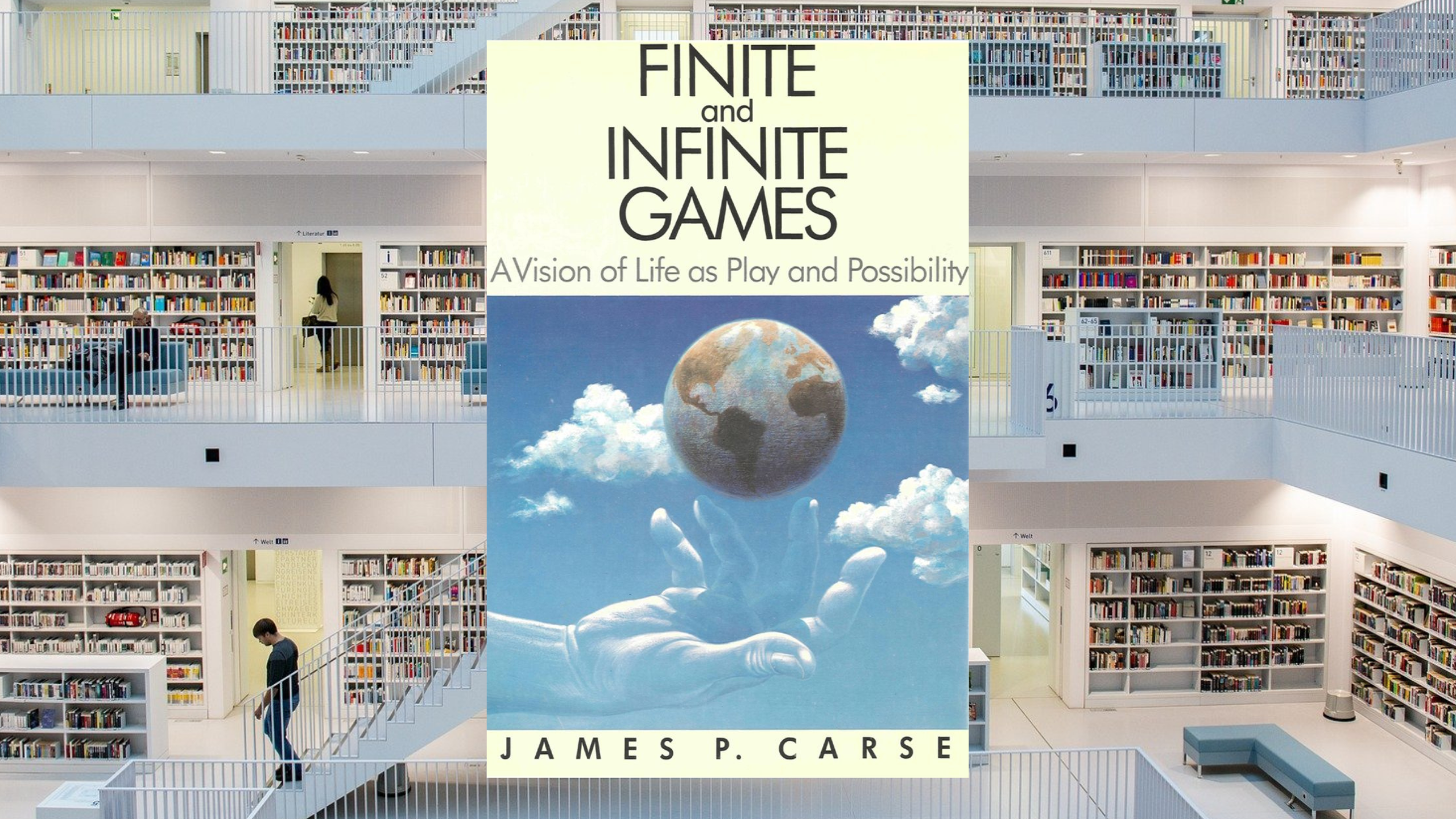
Summary:
This Book is For:
- People who are perpetually unsatisfied with the easy answers that society often offers them and with the rules that cannot be questioned.
- Readers of philosophy who are looking for a worldview as revelatory and far-reaching as that of Hegel or Wittgenstein.
- Curious people everywhere who wonder whether there is more to life than what most people naturally assume there is.
"There are at least two kinds of games: finite and infinite. A finite game is played for the purpose of winning, an infinite game for the purpose of continuing the play."
Thus begins one of the most endlessly fascinating philosophy books you're ever likely to come across - and one that can impact your life in ways that you can't unsee once you've seen them for the first time.
The distinction between finite and infinite games is kinda important, so let's start there! A finite game is any activity with clear, identifiable rules, clear boundaries, and clear winners and losers - everything from a football game to an international conflict.
The purpose of an army is to defeat the enemy so decisively that they cannot continue, and in the case of the football team, at the end of the game there's no more time left, and an ultimate winner and loser have been decided. Most people, as you can see, are familiar with finite games - elections, contests, obtaining a university degree, etc.
Infinite games, by contrast, are played in order to keep playing, to see how far you can go. Relationships are infinite games; so is the act of reading; and basically discovery and education of any kind - these all stretch on ahead forever and ever with no clear "winner" or "ending." You'll never "win" a marriage, or get to the "end" of education, as we'll explore later.
Finite games can also be contained within infinite games. For example, an election can decide the winner of a certain political position, but the election is the finite game within the infinite game of the development of a peaceful, prosperous, healthy, and happy society. A football game is a finite game, but the NFL itself is an infinite game, because the purpose of the league is to allow there to be a next season! If one team became so completely dominant that it wasn't worth their while for the other teams to even show up (ahem, Patriots, ahem), then the very existence of the infinite game of football itself is in danger.
Yes, it certainly can get confusing sometimes - this is not an "easy" book to read - but it's exceptionally rewarding once you start to grasp its basic implications. Infinite games make life incredibly exciting and wonderful! It gives completely new direction and meaning to activities we'd otherwise outgrow or ignore.
For example, you start to see that a lot of what we experience as solid facts of social reality are actually malleable and fluid. We are under no compulsion to play a finite game, even though our social conditioning keeps telling us that we need to fit in, do as everyone else does, and not question anything we're told.
Infinite games are much more interesting, fulfilling, and collaborative. Helping our players win (and they are all our players) is a much more enjoyable, fruitful game, and not knowing where it all leads is a big part of the fun! As they say, beyond the mountains are just more mountains.
The themes explored in Finite and Infinite Games range from the difference between "education" and "training," and between "power" and "strength," to the nature of evil, our responsibilities towards others, and more. It touches on every part of life, but the final chapter consists of just one single sentence:
"There is but one infinite game."
By this, Carse means that all life, throughout the universe and all creation is bound up in the Infinite Game. And as Alan Watts said,
"You are something that the universe is doing, in the same way that a wave is something that the whole ocean is doing."
You are all of it, and every single "player," so to speak, is infinitely valuable to the functioning of the rest of the cosmos. There are no "extra" players in the game of Life, we're all just figuring this out as we go along, and our greatest adventures lay still further ahead.
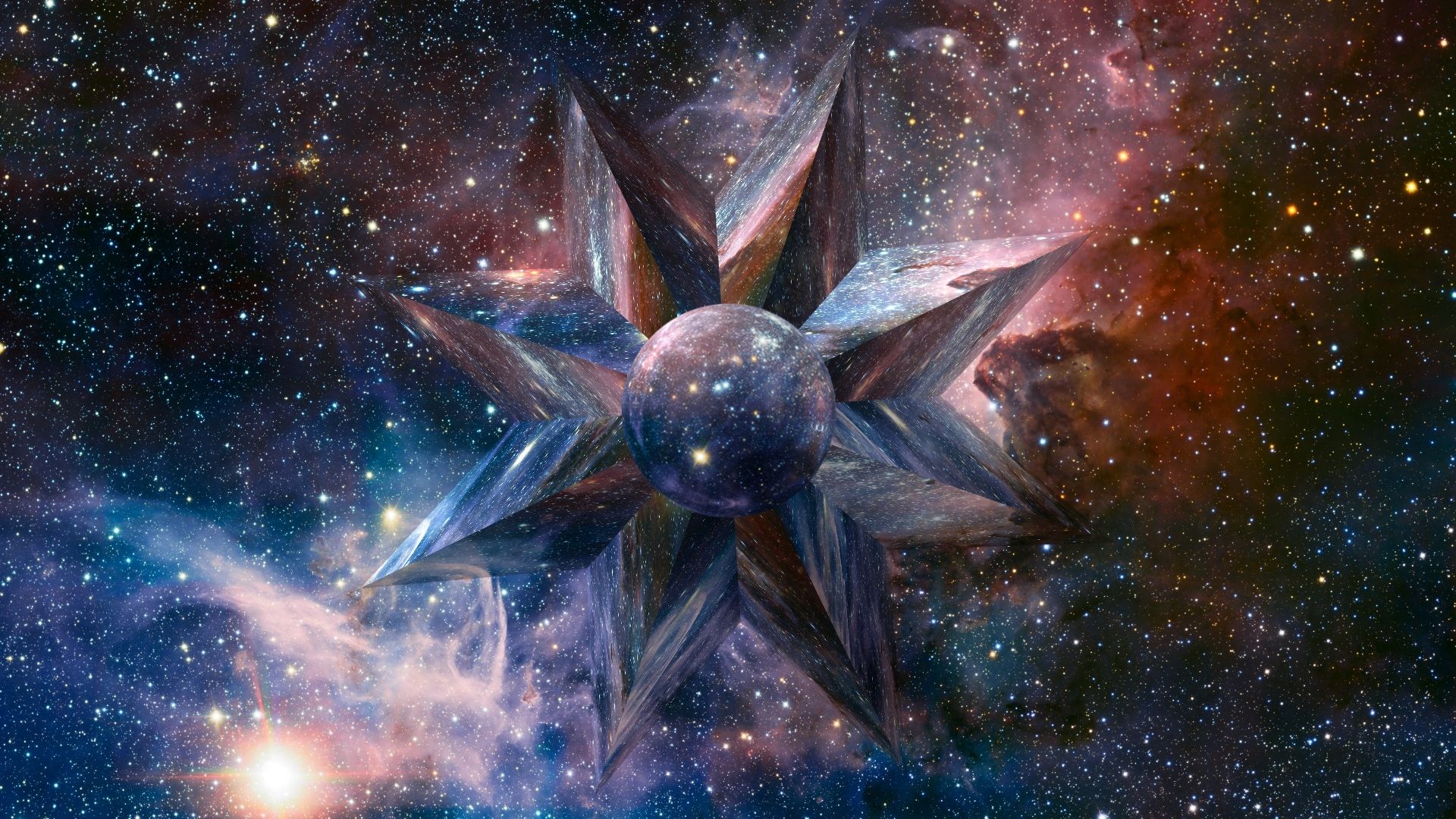
Key Ideas:
#1: Human Beings Can Play Two Types of Games
There are two types of games, finite and infinite. Finite games have clear winners and losers, clear rules, and clear guidelines about who can play and who is excluded, and they are played to a clearly-defined end. In other words, the purpose of finite games is to reach the end and determine the winner(s), as opposed to infinite games, whose purpose is to extend play indefinitely. Some examples might make this distinction clearer.
Examples of finite games include sports, wars, debates, and contests, where it's usually pretty clear who won and who lost. One team scores more goals than the other team, one country surrenders to the other, the soundness of your adversary's argument refutes your own and you concede defeat.
Infinite games, by contrast, are much more interesting. Their purpose is to keep the game going, to discover new territory during the course of play, and to extend the limitations and boundaries of the players. Reading is an infinite game because you'll never exhaust the intellectual wonders of the printed word; you'll never "win" reading. I've tried!
Relationships are another example of an excellent infinite game because you can never really "know" another person completely. We are, each of us, island universes, unknowable, and even vast parts of ourselves remain hidden from conscious introspection. Getting to know another person can go on forever and ever, with no one "winning" or "losing" the relationship, only two people engaging in endlessly new discoveries of the other's infinite uniqueness.
Crucially, it's possible to play both finite and infinite games simultaneously, and we all do. Sports are exciting, fun, and challenging, and they can bring out the best in us; hierarchies of "better" and "worse" exist in all corners of human life, and there's nothing intrinsically wrong with that.
It's just that finite games tend to be ultimately unsatisfying, whereas infinite games contain most of the meaning and fulfillment available to human beings. It's the ability to see that you're playing a game and that you can play a different game if you so choose, that's most important to understand. You can be in the world but not of it.
#2: You've Chosen the Game You're Currently Playing
“Although it may be evident enough in theory that whoever plays a finite game plays freely, it is often the case that finite players will be unaware of this absolute freedom and will come to think that whatever they do they MUST do."
There's one manifestation of finite and infinite games that hardly anyone ever talks about: the structure and functioning of society itself. Shirts and underwear don't exist in a state of nature, and we only wear them (thankfully) because we've all collectively agreed that it's better for all of us that we do!
We're not "required" to wear pants at all. We're not required to be polite to people and say please and thank you either, but it makes the game that much more pleasant for the rest of us. We don't have to play by society's rules at all, but we've been socially conditioned to believe that our game is right and true and that our beliefs are true and self-evident. This is a convenient fiction.
Now, the social world is where the best parts of the infinite game, as well as the worst parts of the finite game, manifest themselves, but we don't have to play. Just like in monopoly or chess, we can walk away; we don't have to participate in the frantic struggle for prestige and fortune; we don't have to hate anyone for the naturally-occurring pigmentation of their skin; we don't have to invade some country that we've collectively decided is more evil than we are. We can just decide to play a different game.
People think that they have to go to college and get a "good job" and "make their parents proud" and all the rest of it; they think that the janitor they walk by on their way to the office is "losing" in the deadly-serious business of Life. But again, it's just a game that we've decided to play. We are free to choose - in all situations, at every moment - and we are never compelled to play any particular game, finite or infinite, even though social conditioning tries to convince us otherwise.
In exactly the same way, Alan Watts pointed out that you can never seriously say, "You must love me," because that can never be real love. Real love can never be compelled, and it's characteristic of play that it's freely chosen. As Carse writes:
“There is no finite game unless the players freely choose to play it. No one can play who is forced to play. It is an invariable principle of all play, finite and infinite, that whoever plays, plays freely. Whoever MUST play, cannot PLAY.”
#3: Evil is the Termination of Infinite Play
In a limitless universe, each thing also contains its opposite. That's why in order to have shapes you have to have solids; softness and hardness create each other, and the same with light and dark, good and evil, up and down. Movies wouldn't be interesting if there were no villains, and nobody would play tag if nobody were "It."
The infinite game that encompasses all life is ruined - becomes finite - when one player (someone or something "bad") is singled out for elimination or denigration. In that case, it ceases to be a game worth playing. Almost any "ism" you can think of falls under this category; the infinite player simply has no use for racism, or sexism, or ageism, or anything else. They're boring - finite.
Infinite play is synonymous with the eternal unfolding of the universe itself - all parts of it. And it's all necessary. What's "good" keeps the infinite game going, and "evil" is what says that this group over here can't play in our infinite game, or those people over there are somehow "less than" these people over here. That's all nonsense. Carse writes:
“Infinite players understand the inescapable likelihood of evil. They therefore do not attempt to eliminate evil in others, for to do so is the very impulse of evil itself, and therefore a contradiction.
They only attempt paradoxically to recognize in themselves the evil that takes the form of attempting to eliminate evil elsewhere. Evil is not the inclusion of finite games in an infinite game, but the restriction of all play to one or another finite game."
#4: There Are No Single-Player Games
“No one can play a game alone. One cannot be human by oneself.”
Life is relationship, and whenever you pull on a string, you'll eventually find that it's intimately bound up with everything else that exists in the universe, has ever existed, or will ever exist in the future.
James Carse is saying here that the category "human" would cease to refer to a player in a game - finite or infinite - if there were no other humans who could play with them. Our games depend on being connected to others, and our actions create the possibility for their further play. We open up limitless opportunities for other players to develop, grow, discover, and play.
The logical conclusion of this line of thinking is that there are no "extra" people in the world and that trying to eliminate players you've designated as "evil" is to risk becoming evil yourself.
Does that mean we shouldn't punish offenders? Persecute wrongdoing? Of course not. We have to do that, obviously. But our social game has, over time, enacted laws and statutes that overall do a good job of laying down the conditions of infinite play.
No human being is any other human being's natural enemy. All of it is a finite game that we've unfortunately been playing against each other for far too long. But when we realize that in order to become someone's enemy, we have to agree to become their enemy in the first place, we'll see the truth of Carse's statement:
“Before I can have an enemy, I must persuade another to recognize me as an enemy.”
#5: Education VS. Training
“Education leads toward a continuing self-discovery; training leads toward a final self-definition.”
Training is finite, and education is potentially infinite. No one, anywhere, ever, has ever been "educated," because one can't possibly get to the bottom of true education! It truly is an infinite game, and the more you know, the more you realize how much you still don't know. To be "educated" is to know that you know nothing.
Take me for example. I've read 1,000+ books over the last 8 or 9 years, I've traveled and heard and seen and discussed and thought, and I feel as though I know even less now than I did before! In a sense, I do know less than ever before, because I've seen how vast and limitless is the ocean of human knowledge, how little we're ever able to grasp in such a short lifetime.
Education will always be surprising, whereas training leads to a specific result. Now, of course, people need to have training! Heart surgeons need to be trained in heart replacement surgery, therapists need to be trained in their respective disciplines, and pilots need to be trained in order to keep their planes in the sky.
It's just that when I look to my "education," I see that I still don't know who I am, where I came from, where I'm going, or what I'm going to do once I get there! I look back in time, look ahead to where people think we're headed, I plan and think and ponder and explore and I realize that I'm just out here playing this giant infinite game with no idea where this crazy ride is taking me. None of us have any idea! Training is the idea that we think we know. Education is surprise and limitless self-discovery.
“The infinite player does not expect only to be amused by surprise, but to be transformed by it, for surprise does not alter some abstract past, but one's own personal past. To be prepared against surprise is to be trained. To be prepared for surprise is to be educated."
#6: The Contradiction of the Audience
“Unless we believe we actually are the losers the audience sees us to be, we will not have the necessary desire to win. The more negatively we assess ourselves, the more we strive to reverse the negative judgments of others. The outcome brings the contradiction to perfection: by proving to the audience they were wrong, we prove to ourselves the audience was right."
Games are always played in front of an audience, because, as we've seen, one cannot be human by oneself. As we've also seen, no one is forced to consider themselves a player in any particular finite game. We can opt out. Except it's that damn social conditioning - and the eyes of the "other" - that keeps us in our places and makes us feel as though we are either winners or losers in the eyes of the world.
In order for this social conditioning to be effective, we have to believe in it. But, what Carse is saying here is that the more worked up we get and the more we push and strive to succeed in the eyes of the world, and the more we ruminate over our place in the social order and scheme to climb higher, the more deeply entrenched we become in this fictionalized social game. We just end up proving the audience's point!
What Carse refers to as "self-veiling" means to hide our infinite nature from ourselves - to see ourselves as finite when in reality we are infinite; to see ourselves as bounded, when we are actually free. We've done it to ourselves! We've hidden ourselves from ourselves, and so we are the ones who can free ourselves.
“Self-veiling is a contradictory act - a free suspension of our freedom.”
#7: "There Is But One Infinite Game."
The final chapter of Finite and Infinite Games consists of just one sentence: "There is but one infinite game." By this, Carse means that all life, throughout the universe and all of creation is bound up in the Infinite Game. As Alan Watts might say, the ocean just goes on "waving," the universe "universes," and this is the process that has been going on forever and ever. And we are part of it! How cool is that?!
The best part about all this is that it takes most of the pressure off. Life doesn't have to be so deadly serious all the time - we can play! Yes, people we love get sick, rude people seem to spread like viruses, and we face real humanitarian challenges all over the world; these are real problems and so I am in no way saying that it's "just a game," and that we shouldn't do everything we can to support the further growth, development, and salvation of all those with whom we share the planet. On the contrary, they are all infinite players just as important as you and I! We are on the same team - the universal, human team - and we need to stick together!
Look, "living," by which I mean life itself...is something extraordinary. It can be a great adventure and a hell of a lot of fun if we play it right. Our "problems" just exist to make the game more interesting (boring games don't get played), and even though alone we are limited, together we are infinite.

Book Notes:
“In one respect, but only one, an infinite game is identical to a finite game: of infinite players we can also say that if they play they play freely; if they MUST play, they cannot PLAY."
“The rule-making capacity of infinite players is often challenged by the impingement of powerful boundaries against their play - such as physical exhaustion, or the loss of material resources, or the hostility of nonplayers, or death. The task is to design rules that will allow the players to continue the game by taking these limits into play - even when death is one of the limits. It is in this sense that the game is infinite."
“Oppressors themselves acknowledge that even the weakest of their subjects must agree to be oppressed.”
“No one is under any necessity to play a finite game.”
“The world is elaborately marked by boundaries of contest, its people finely classified as to their eligibilities.”
“Strength is paradoxical. I am not strong because I can force others to do what I wish as a result of my play with them, but because I can allow them to do what they wish in the course of my play with them."
“What seems necessary is often only possible.”
“All the limitations of finite play are self-imposed limitations.”
“Infinite games are internally defined.”
“There is an outside to every finite game.”
“To believe is to know you believe, and to know you believe is not to believe.”
Jean-Paul Sartre
“Surprise causes finite play to end; it is the reason for infinite play to continue.”
“More often what one intends to preserve is a public personage, a permanently veiled selfhood. Immortality is the state of forgetting that we have forgotten - that is, overlooking the fact that we freely decided to enter into finite play, a decision in itself playful and not serious. Immortality is therefore the supreme example of the contradictoriness of finite play: It is a life one cannot live."
“Power will always be restricted to a relatively small number of selected persons. Anyone can be strong.”
“Because power is inherently patriotic, it is characteristic of finite players to seek a growth of power in a society as a way of increasing the power of a society. It is in the interest of a society therefore to encourage competition within itself, to establish the largest possible number of prizes, for the holders of prizes will be those most likely to defend the society as a whole against its competitors."
“Wealth is not so much possessed as it is performed.”
“Creativity is a continuity that engenders itself in others. Art is not art, therefore, except as it leads to an engendering creativity in its beholders. Whoever takes possession of the objects of art has not taken possession of the art.”
“Because patriotism is the desire to contain all other finite games within itself - that is, to embrace all other horizons within a single boundary - it is inherently evil.”
“States can have only states as enemies; they cannot have persons as enemies.”
“War presents itself as necessary for self-protection, when in fact it is necessary for self-identification.”
“Under the constant danger of war the people of a state are far more attentive and obedient to the finite structures of their society.”
“One cannot be free by opposing another.”
“My freedom inherently affirms yours.”
“A people has no enemies.”
“As finite players we will not enter the game with sufficient desire to win unless we are ourselves convinced by the very audience we intend to convince.”
“Whenever we act as the genius of ourselves, it will be in the spirit of allowing the past to be past. It is the genius in us who is capable of ridding us of resentment by exercising what Nietzsche called 'the faculty of oblivion,' not as a way of denying the past but as a way of reshaping it through our own originality. Then we forget that we have been forgotten by an audience, and remember that we have forgotten our freedom to play."
“Work is not an infinite player’s way of passing time, but of engendering possibility.”
“Their reading of the poetry is itself poetry.”
“Infected then by the genius of the artist they recover their own genius, becoming beginners with nothing but possibility ahead of them. If the goal of finite play is to win titles for their timelessness, and thus eternal life for oneself, the essence of infinite play is the paradoxical engagement with temporality that Meister Eckhart called 'eternal birth.'"
“A god can create a world only by listening. Were the gods to address us it would not be to bring us to silence through their speech, but to bring us to speech through their silence."
“True storytellers do not know their own story. What they listen to in their poiesis is the disclosure that wherever there is closure there is the possibility of a new opening, that they do not die at the end, but in the course of play. Neither do they know anyone else's story in its entirety.
The primary work of historians is to open all cultural termini, to reveal continuity where we have assumed something has ended, to remind us that no one's life, and no culture, can be known, as one would know a poiema, but only learned, as one would learn a poiesis. Historians become infinite speakers when they see that whatever begins in freedom cannot end in necessity."
“Myths of irrepressible resonance have lost all trace of an author.”
“Myth is the highest form of our listening to each other, of offering a silence that makes the speech of the other possible.”
"Perhaps the Christian myth has been the narrative most disturbing to the ideological mind. It is, like those of Abraham and the Buddha, a very simple tale: that of a god who listens by becoming one of us. It is a god 'emptied' of divinity, who gave up all privilege of commanding speech and 'dwelt among us,' coming 'not to be served, but to serve,' 'being all things to all persons.'
But the worlds to which he came received him not. They no doubt preferred a god of magisterial utterance, a commanding idol, a theatrical likeness of their own finite designs. They did not expect an infinite listener who joyously took their unlikeness on himself, giving them their own voice through the silence of wonder, a healing and holy metaphor that leaves everything still to be said."

Important Insights from Related Books:

The Birth and Death of Meaning, by Ernest Becker:
This is a relatively forgotten - but excellent - book by one of my biggest intellectual influences, Ernest Becker. The unhelpful Amazon description says that it uses the disciplines of psychology, anthropology, sociology, and psychiatry to explain what makes people act the way they do, but it's so much more than that.
It explores our "social fictions," our ideas that our customs and beliefs are unimpeachably true and real, and that we possess a solid "self" that exists independently of what others believe about us.
As an aside, one of my favorite stories about Ernest Becker is that when the University of California, Berkeley, threatened to drop him as a professor, his students got together and offered to pay his salary. Honestly, I probably would have joined them.
"The only way that man could securely know that he was a hero would be if he really knew what was going on in evolution on this planet and in the cosmos. If he knew for sure how things were supposed to come out and where his part fit into the outcome, then he could relax and accept death because his life would be lived in the Truth of Creation. But this is precisely what he cannot know, can never know. And so the bitter defensiveness of his fictions, the desperation of his pretence of certainty that his cultural hero-system is the true one."
“The world of human aspiration is largely fictitious and if we do not understand this we understand nothing about man.”
“We have become victims of our own art. We touch people on the outsides of their bodies, and they us, but we cannot get to their insides and cannot reveal our insides to them. This is one of the great tragedies of our interiority - it is utterly personal and unrevealable.
Often we want to say something unusually intimate to a spouse, a parent, a friend, communicate something of how we are really feeling about a sunset, who we really feel we are - only to fall strangely and miserably flat.
Once in a great while we succeed, sometimes more with one person, less or never with others. But the occasional break-through only proves the rule. You reach out with a disclosure, fail, and fall back bitterly into yourself.”
This Book on Amazon: The Birth and Death of Meaning, by Ernest Becker
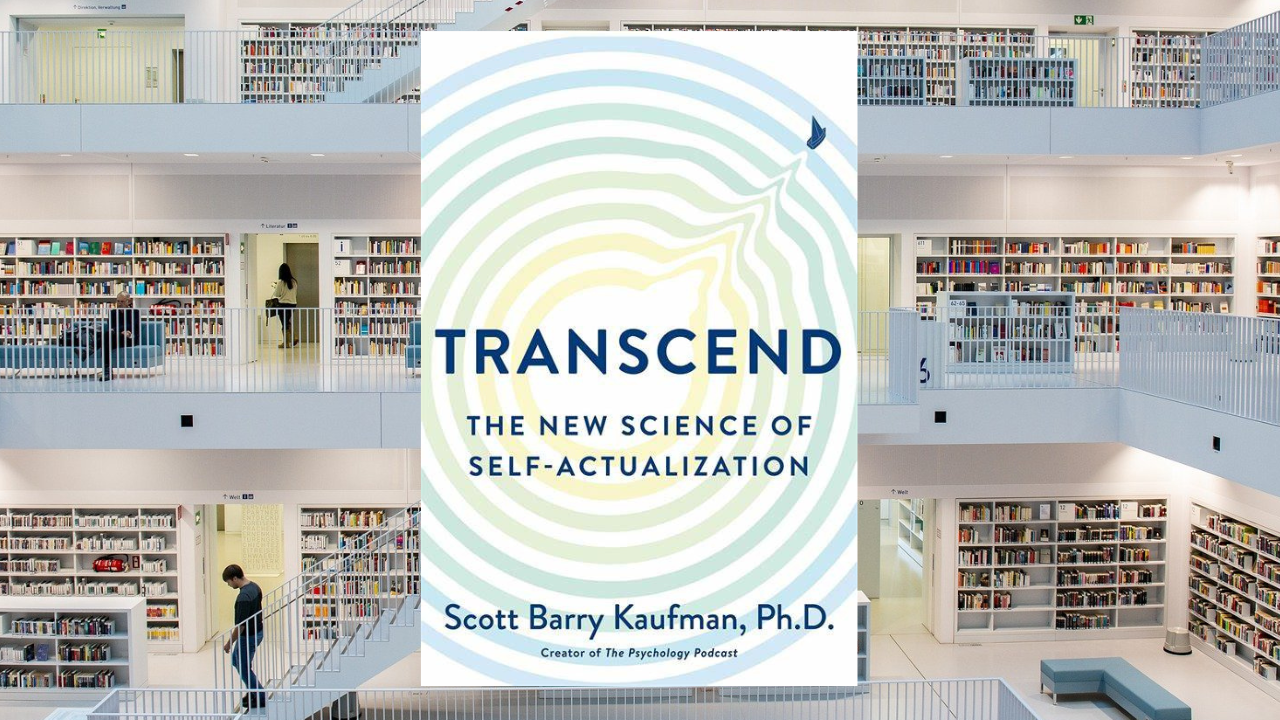
Transcend, by Scott Barry Kaufman:
Maslow was an American psychologist who is often credited with hammering out a hierarchy of needs - that same pyramid you were probably made to memorize in school - that includes the basic "security" needs of safety, connection, and self-esteem, and then moves through to the "growth" needs of exploration, love, and purpose.
In Transcend, Dr. Kaufman shows how, right up until the end, Maslow was extending his world-famous ideas about self-actualization and self-expression and moving into the territory of transcendence, or interconnection between the fates and destinies of every human being alive on Earth.
“Within the humanistic psychology framework, the healthy personality is considered one that constantly moves toward freedom, responsibility, self-awareness, meaning, commitment, personal growth, maturity, integration, and change, rather than one that predominantly strives for status, achievement, or even happiness."
“I do not accept any absolute formulas for living. No preconceived code can see ahead to everything that can happen in a man's life. As we live, we grow and our beliefs change. They must change. So, I think we should live with this constant discovery. We should be open to this adventure in heightened awareness of living. We should stake our whole existence on our willingness to explore and experience."
-Martin Buber, 20th-century philosopher
“I think of the self-actualizing man not as an ordinary man with something added, but rather as the ordinary man with nothing taken away.”
-Abraham Maslow
Read the Full Breakdown: Transcend, by Scott Barry Kaufman

The Revolution from Within, by Jiddu Krishnamurti:
This was my first introduction to Krishnamurti and it made a massive impact on me, causing me to come away from this book with about a dozen pages of notes. It's an edited transcript of a few of his public talks in various cities throughout the world in the 1950s, on topics including intellectual freedom, meditation, belief, fear, greed, authority, and right living. It's a truly astonishing volume that very well may end up being a turning point in your own intellectual journey. It certainly was for me!
"If we take this journey together, and simply observe as we go along the extraordinary width and depth and beauty of life, then out of this observation may come a love...which is a state of being free of all demand...and we may perhaps be awakened to something far more significant than the boredom and frustration, the emptiness and despair of our daily lives."
"If we did love our children, we would stop all wars tomorrow, obviously. We would not condition our children. They would not be English children or American children, they would just be children."
"The man who is ceaselessly questioning, who has no authority, who does not follow any tradition, any book or teacher, becomes a light unto himself."
This Book on Amazon: The Revolution from Within, by Jiddu Krishnamurti

The Almanack of Naval Ravikant, by Eric Jorgenson:
Naval is the founder of AngelList, a website that allows startups to raise money from angel investors free of charge, and he's had over 70 successful exits himself, after investing in companies like Uber and Twitter before almost anyone else.
The "Navalmanack," as it's sometimes called, is divided into two sections: wealth and happiness. Wealth comes first because, just like in an airplane, you have to help yourself first before you'll be in the best position to help others.
A general theme here is the virtue of playing the long game and deploying the power of compound interest over time. Not just with your investments, but with your relationships, your health, your knowledge, and more. Building a life you love and a character you're proud of takes place over an extended period of time; these things are not to be rushed.
"Let's get you rich first. I'm very practical about it because, you know, Buddha was a prince. He started off really rich, then got to go off in the woods."
“Play iterated games. All the returns in life, whether in wealth, relationships, or knowledge come from compound interest.”
“What if this life were the paradise we were promised, and we’re just squandering it?”
Read the Full Breakdown: The Almanack of Naval Ravikant, by Eric Jorgenson
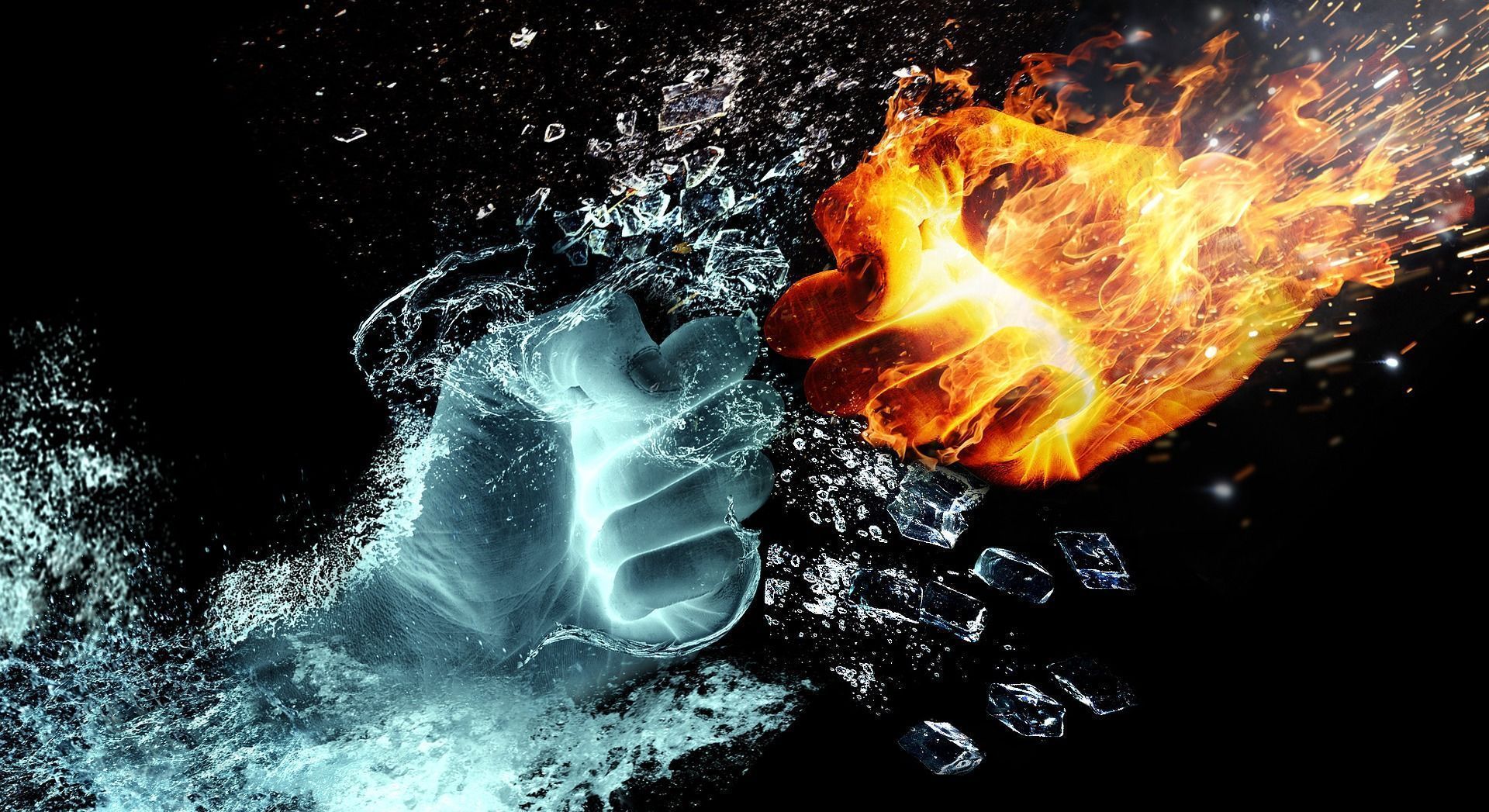
The View from the Opposition:
No one's ideas are beyond questioning. In this section, I argue the case for the opposition and raise some points that you might wish to evaluate for yourself while reading this book.
#1: The Language Could Be Much Clearer
James P. Carse was a brilliant man in many ways, but he left much to be desired in the readability department. I will grant that this is a much more difficult book than it perhaps needs to be, or could have been. So if you struggle while reading it, or some of the ideas just don't hit you quite right, feel free to blame him!
It sometimes feels like you're reading Wittgenstein's Tractatus - a precise, perfectly exact - and sometimes perfectly incomprehensible - stream of aphorisms and propositions that can be really hard to follow. It's not impossible to read, but I did have to read several sections over again before I finally "got it," and no one would blame you if you just couldn't spare the cognitive effort.
#2: Finite Games Can Be Worth Playing
With Carse's obsession with dichotomies, you sort of get the sense that finite games are "bad," while infinite games are "good." While I don't think it was Carse's intention to give that impression, I wouldn't want people to think that finite games are to be avoided at all costs!
There are plenty of worthwhile, finite games - sports, politics, contests - but most finite games are just pointless. I'm thinking here of wars, discrimination of all kinds, etc. By all means, play some finite games! But really, the infinite game's where it's at!
"The test of a first-rate intelligence is the ability to hold two opposed ideas in the mind at the same time and still retain the ability to function.”
-F. Scott Fitzgerald

Action Steps:
So you've finished reading. What do you do now?
Reading for pleasure is great, and I wholeheartedly support it. However, when I'm reading for a particular purpose, I am intensely practical. I want a result. I want to take what I've learned and apply it to my one and only life to make it better!
Because that's really what the Great Books all say. They all say: "You must change your life!" So here, below, are some suggestions for how you can apply the wisdom found in this breakdown to improve your actual life.
Please commit to taking massive action on this immediately! Acting on what you've learned here today will also help you solidify it in your long-term memory. So there's a double benefit! Let's begin...
#1: Observe and Detach
Finite games are so engrossing because they present themselves as being the only game in town. It's our social conditioning - the ways that we're influenced by our peers - that causes us to mistake our own individual, finite games for ultimate reality. In fact, many of our habitual ways of living are simply optional.
The first step to removing yourself from unhealthy finite games and moving towards healthier finite games and towards endlessly-enriching infinite games is to observe the fact that you've consented to play a game in the first place.
Meditation is an excellent help with this, as it teaches us to disidentify with our thoughts and our ego and helps us to see the fundamental interconnectedness of all things. As you deepen your meditation practice - or even just sit in silence with your own thoughts - observe the craziness and the senseless destruction perpetrated in the name of certain finite games and refuse to be a part of it.
#2: Choose an Infinite Game to Play
There are many, many great games you can play, and you're only limited by the power of your imagination. Mastery, knowledge, compassion, and service are all infinite games, the permutations of which extend much further than may be obvious at first.
I've mentioned reading as being an excellent infinite game, but there's also marriage, friendship, philanthropy, exploration - I literally couldn't name all the different examples and combinations that are possible. This world offers us so many opportunities for development and discovery, and if you start down that path you'll never be bored or reach the end.
#3: Don't Neglect Finite Games
Finite games have kind of gotten a bad rap in this breakdown, but most of them aren't inherently evil! They can just be taken too far. I'm not saying "don't play football," I'm just saying that to work yourself into some psychotic frenzy because of what jersey some other person is wearing is just a bit ridiculous, don't you think?
The main idea here is that finite games can be a wonderful source of growth and development, and they're usually contained within some larger, infinite game that's also worth playing. Healthy competition between friends may take the form of some finite game, but it's all part of the overarching, infinite game that is your developing friendship.

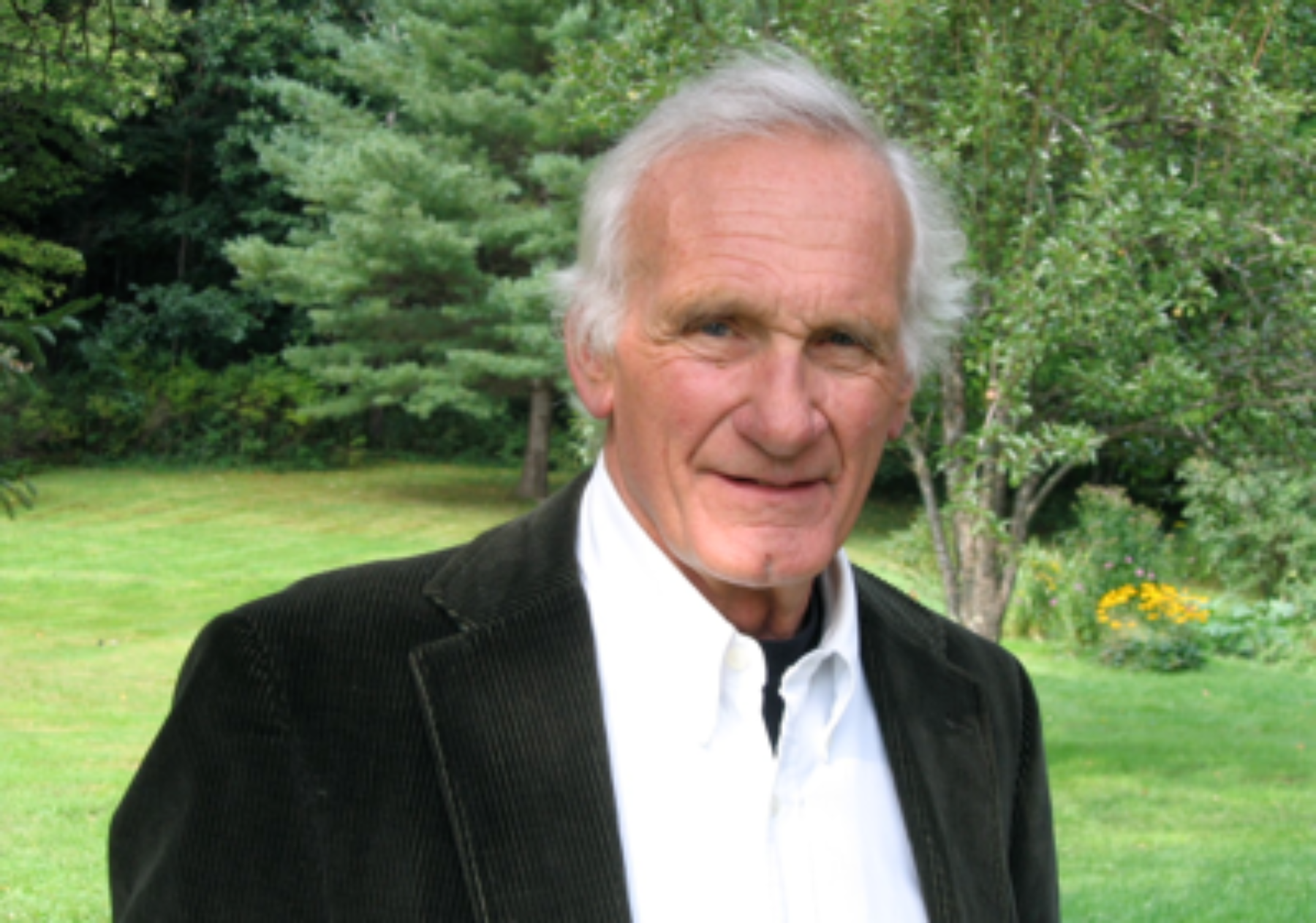
About the Author:
James P. Carse taught at New York University for thirty years as the Professor of the History and Literature of Religion, and Director of the Religious Studies Program, and was the recipient of numerous teaching awards. He retired from the University in 1996.
He was a writer and an artist, and his books include Jonathan Edwards, The Silence of God, Finite and Infinite Games, Breakfast at the Victory, The Gospel of the Beloved Disciple, The Religious Case against Belief, and PhDeath: the Puzzler Murders.
Additional Resources:
James P. Carse and Simon Sinek - Podcast
The Future of Infinite Games - Kevin Kelly
Never Win the Infinite Game - David Blixt
This Book on Amazon:
Finite and Infinite Games, by James P. Carse
If You Liked This Book:
Breakfast at the Victory, by James P. Carse
The Infinite Game, by Simon Sinek
Man's Search for Meaning, by Viktor Frankl
12 Rules for Life, by Jordan Peterson
The Revolution from Within, by Jiddu Krishnamurti
The Birth and Death of Meaning, by Ernest Becker

